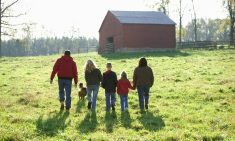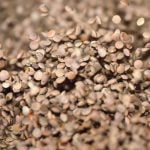“We left the hospital, and went to tell my grandmother he had died, then I came home and loaded trucks at two in the morning,” says Jackson. Neighbours rushed to help, but “Dad hadn’t even been dead for four hours and I had no choice but to keep farming.”
Hard as it was at the time, in retrospect 25-year-old Jackson says the work was probably what kept her going through those first, tough weeks. “I didn’t have time to stew over my emotions,” she says. “Farming is the one thing I have always done, so that’s what I kept doing. I don’t think that I could be doing anything more right now to make my dad proud than continuing working and farming.”
Read Also

Sibling squeeze part 6: The emotional stakes of a family legacy
The final instalment in a six-part series exploring the challenges of sibling conflict and the effect it can have on…
Jackson describes her mom, Audrey, as a “wonder woman” but she has a full-time, off-farm job, so it was down to Jackson to fill the void left by her dad on the family farm, including its specialty of producing game birds in Lambton County in Ontario’s southwest.
“Dad did a lot of the field work, and all of the farm maintenance, and his specialty was the hatching and incubator work,” says Jackson. “He always seemed to be able to fix things, so if something breaks I have to stand there and think before I get myself too worked up.
“It’s definitely been a learning curve and very stressful, but I always think, what would he do? And I can normally figure it out.”
An Investment for Life
The farm, purchased by Jackson’s grandfather in the 1940s, was originally a mixed operation with crops, beef cattle and turkeys, but at six years old, Jackson’s dad began to also raise pheasants for the local township for its yearly release into the wild. That side of the family business grew and grew until it became a mainstay of the farm’s production.
In her last year of high school Jackson spent a semester doing a work co-op at the hatchery from which they purchased their six-week-old birds. “I did a lot of growing up very quickly,” she says. “But I always wanted to work, that’s what I loved to do, so it wasn’t a problem for me.”
She enjoyed it so much she continued to work summers at the hatchery and drove back and forth to the farm during her first year of agricultural diploma studies at Ridgetown College.
Eventually, her parents had a proposal and asked her the question that would shape her future. “I came home one weekend and my parents said, ‘Do you love it?’ I said, ‘Absolutely.’ They said, ‘Could you do that for the rest of your life?’ I said, ‘One hundred per cent,’” Jackson says. “And so we went ahead and purchased the hatchery business from the owner.”
By her second college year, the family was rebuilding the hatchery at their farm and starting their own breeding flock of Chukar partridge. From the outset, Jackson was heavily involved in the decision-making on everything from pouring the concrete to designing the production setup.
“It was hard still being away at school and trying to get everything set up at the farm,” she says. “But it was an investment for the rest of my life, so I extended my college over three years so it was less stressful on me. Luckily, Ridgetown College is only about an hour from home so it wasn’t too bad commuting.”
Learning to Delegate
Jackson and her mom and dad were already partners in the business, but settling the personal and business estates turned out to be a long and painful process. “We realize now that it could have been simplified by having a written partnership agreement, which would have stated what would happen with the shares if a partner left or passed away,” says Jackson.
“We didn’t have this… I would advise anyone in a partnership or business relationship to get this done.”
The past few months have taught Jackson a lot of things, among them that she can’t do everything herself. “I have had to learn to delegate, and focus on certain tasks and let other people do other things,” she says. “Not everybody knows how to breed and raise pheasants, but I do, and there are many people that can grow a lot better crop of soybeans or corn than I can.”

Now she has their crop ground out on crop-share, and although she has some part-time high school and college students, she is looking to hire a full-time employee at some point, taking her time to find the right person. “I don’t want to hire just anybody. I want to be really picky about them because I have to work with them day in, day out, side by side and I really want to pick a good person that will work well with our team.”
There are times when she wishes she had asked more questions, or simply made more time to pay attention to things that at the time she felt she was too busy for. “How many times, when you’re working on the farm with your partner, or your father, or whoever it is, do they say, ‘Come here, let me show you how to do this’ and you say, ‘I’ll learn another day. I don’t have time to do that today’,” she says.
“You have to take advantage of those situations because you never know what’s going to happen.”
As with many other farms, record-keeping wasn’t a priority, and Jackson says she has realized how important it is, and to pass on knowledge to others. “Farming records are so important, like why we fed a certain ration, and when and where we dug up a tile main and put in a new eight-inch pipe over here,” she says. “It’s something that I’m trying to do, and I’m trying to show my employees more things, so I can say ‘Do you remember that one time that I showed you how to reset that auger in the feed mill?’ and they can go and press the button on the bottom side and be good to go.”
Jackson is grateful for the support of her family, friends and the small community that rallied around to help out in any way they could.
“It was an absolute blur, and there were things that you don’t expect people to do but they do, and it was a blessing that I am so grateful for,” she says. “It’s at times like this that you truly appreciate what you have and your family, and friends.
“The advice I would give to anyone in the same situation is don’t be scared to ask for help,” she says. “When you’re having tough times, lean on people because they really do want to help.”
At the same time, she realizes now the importance of self-care. “You try so hard to make sure everything else is okay, but you need to take care of yourself too,” she says. “I didn’t do that for quite some time, and it was very damaging.”
A Unique Production Cycle
The family took advantage of high land prices in the area a couple of years ago and sold off some of their land which allowed them to eliminate some debt. Downsizing is also more manageable for a business that requires Jackson to be travelling at times when most farms are busy with harvest or fieldwork.
Running a game bird farm, which now also breeds pheasants, Eastern wild turkeys, Hungarian partridge and Bobwhite quail isn’t like running a grain or traditional livestock operation. Because the farm sells live chicks, six-week-old birds, eggs and mature birds, it has very different production and delivery schedules, and from September to December, Jackson is on the road delivering adult pheasants for meat and hunting throughout Ontario, Quebec and Michigan.
Standing Up to Sexism
Jackson, who is a single mom to two-and-a-half-year-old Scarlett, has run into her fair share of sexism, and it irks her — a lot. She recalls the time she was pricing out a new building and was discussing it with a salesman at an agricultural show. “My dad was a general contractor; we built our own hatchery, so I’m not totally oblivious to the construction world,” she says. “I had a conversation with the sales guy and he gave me his card and said, when you’re ready to talk more, let your husband or your father know.”
She told him her father just passed away and she’s separated from her husband, and she ended strong. “I’m the one that signs the cheques,” she said, “so if you want to do business you’re going to have to do business with me.
“Sometimes you just have to stand up and say I’m a female, and I can run a farm, and I probably know just as much as you do.”
Jackson has learned to stand up for herself and her farm, and admits she’s had to be aggressive at times to get what she needs.
“I’ll be polite and courteous for as long as I possibly can and then, if I have to tell you how I really feel, I’m going to do that,” she says. “I don’t like doing that but sometimes you have to show the not-so-pretty side, because if that’s what’s going to get the job done at the end of the day, then that’s what you have to do. I think even when women do this sometimes they don’t get taken seriously.
“It is important for us to stand up and say ‘I might not be as big and scary as Joe farmer over here but I can be.’ It’s a very difficult line to cross and especially in business because you don’t ever want to do any harm to your business, but you still have to advocate for your business.”
Running a farm business, and raising a small daughter alone isn’t easy. She does have her mom and other family members and friends to help her out, for which she is ever grateful, but there are times when it can be overwhelming, and she has to make sacrifices for both the farm and her daughter’s sake.
“When non-farm moms talk about guilt, I want to laugh,” she says. “It sounds terrible but I do because when they say they are going back to work and feeling so guilty about it, I want to tell them, I went back to work when my child was four months old… every decision that I have made has been for my daughter, so I can advance this farm, and if she wants to farm someday, she can. If I didn’t make some of those really difficult choices, I know the farm would have suffered.”
It’s been tough for Jackson to cope with everything since her dad’s death, but she is comforted in knowing that she has always been there when her daughter needed her, and says it’s not about the amount of time that she spends with her, it’s about the quality of that time. “When Scarlet was young, we hooked a jolly jumper up to one of the door frames in the hatchery so that I could count and box chicks while she was in the jolly jumper,” she says. “I’m very lucky that the farming operation that we have, if she needed to be with me, she could be with me and she would be safe.”
And Scarlet doesn’t appear to be suffering. She is the first little person to want to pick eggs and go see the turkeys. “These are the things that she enjoys. She loves the farm, and if I can help her build a good work ethic along the way then that’s wonderful,” says Jackson. “There are a lot of people that really wish that their children could grow up on farms so I’m super blessed that Scarlet has that option.”
A Passion for Agriculture
Jackson’s love of agriculture goes way beyond the farm. She is a member of Ag Women’s Network Facebook group, now almost 1,900 members strong and shares her passion for the industry through social media. She is also involved at the political level as an elected member of the policy advisory committee of the Ontario Federation of Agriculture (OFA) and is vice-president of Lambton Federation of Agriculture.
“The OFA policy advisory committee is a large group of farmers from all over the province and it’s helping to shape discussion and give grassroots feedback to the OFA board and staff on how we feel things should be handled. It’s very interesting to be a part of,” she says. “You can sit and be a keyboard warrior for however long and complain about things on Twitter, or you can actually get involved in policy framework and let your voice be heard. You have to take away time from the farm to do that, but if that’s going to help your farm down the road then it’s beneficial to do so.”
Jackson says although she understands why a lot of women and young farmers are apprehensive about joining organizations or getting involved in the policy side of agriculture, she believes it would help the industry if more of them were open to the opportunity.
“I was very apprehensive about it at first,” she says. “For my first half-dozen meetings, even at our local federation level, I didn’t say a word, but then you find that thing that you’re passionate about, and you really want to talk about. You take that under your wing, and run with it and that’s how you become a beneficial member to the board.”
Not that she believes in gender quotas on boards. “I don’t believe in that. I believe that if you belong on that board, you do a good job and you make your place there,” she says. “I don’t think that every board needs to have a female on it. Whoever is best suited for the position on a well-rounded board should be elected… I think that females should be just as hardworking and understanding as their counterparts.”
Why Farmers Love Social Media
Like so many of her contemporaries, Jackson loves social media and sees it as a great way to present a fair and balanced image of farming, connect with peers and positively influence the opinions of the non-farming public.
“Farmers love social media because we can portray ourselves to the general public, but I like farmers who show everything, the good, the bad, the ugly because that’s what farming is,” says Jackson, who recently ran a week-long Snapchat campaign where she posted pictures about all aspects of her life on and off the farm.
Jackson connects with many other women and men involved in agriculture, and it’s really about finding your “tribe” rather than finding your specific gender bias. “Finding those key people that understand you, that you can talk to is huge,” she says, “Not every farmer can go and hang out with their friends three or four nights a week but you can sit in your office at the farm and send a couple of Tweets, have a couple of laughs, and have good conversations. I’ve got a lot of friends on social media that I’ve only met a handful of times but they’re wonderful people and I consider myself really close to them.”
Future Hard to Map Right Now
Asked where she sees herself in five or 10 year’s time, Jackson has difficulty answering. “If you had asked me that eight months ago I’m sure I would have had the perfect answer,” she says. “Right now, one day at a time is my biggest focus. If I can get through this year and get started into next year that’s a whole other fresh start. Getting through one season, one hatching season, one cycle without my father, that’s huge. It’s been extremely difficult but with every challenge I face I know that if I can do it once then I can do it again. That’s what’s kept me going.”
The only thing she knows for sure is that she still wants to be farming, and is focusing on making the farm sustainable so it will be there if Scarlet decides she wants to farm too one day. Meanwhile, Jackson is grateful for the people in her life and tries to take each day as it comes because she knows how precious they can be.
“It was a couple of days after Dad passed away and our neighbours just down the road, they had a grain buggy and the axle snapped on it and that grain buggy sat in the field up on blocks for two months,” she says. “Every day that I drove by that grain buggy, I said to myself, ‘That didn’t happen to me today, my day could be worse.’ I just have to be grateful for that.”
















